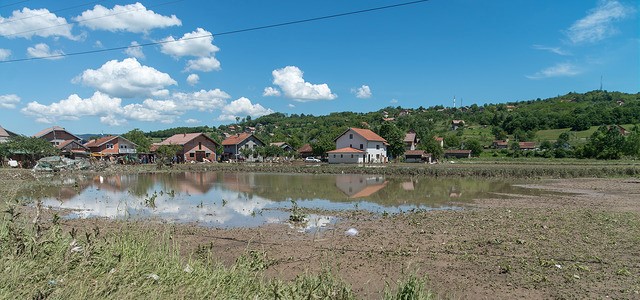Climate change is intensifying the global water cycle and exposing large segments of the world’s population to significant water-related hazards. These are expected to increase in severity over time.
Floods and droughts are becoming more frequent and severe. Rainfall patterns are more unpredictable and sea levels are rising. These changes not only threaten the ecosystem and livelihoods of people – particularly the poorest and most vulnerable – they also pose a major impediment to economic and social development. So it is important for countries to incorporate water security and climate resilience strategies into development plans.
GWP is continuing its support to countries on climate change adaptation, leading towards the implementation of the Paris Agreement. GWP activities under the Global Water, Climate, and Development Programme (WACDEP) has aimed to strengthen the resilience of countries to climate change, and more specifically support countries to implement adaptation-related commitments in the Paris Agreement. Focus areas include support to the implementation of Nationally Determined Contributions (NDCs), National Adaptation Plans (NAPs) processes, South-South Cooperation, and climate financing.
WACDEP has supported countries across the 13 GWP regions to integrate water security and climate resilience in development planning and decision making processes, through enhanced technical and institutional capacity, predictable financing and investments in water security, better drought/flood management and overall climate change adaptation. The WACDEP Coordination Unit (CU) in Africa has been strengthened through relevant strategic alliances and partnerships with Multilateral Development Banks, UN agencies, and others. The CU provides global/regional thematic leadership on strengthening regions and countries. Cross-regional technical support functions are also being established for GWP Asian regions in collaboration with established relevant strategic allies such as UNEP, UNDP, ADB, IWMI, ASEAN, and others.
Through the Programme, GWP contributes to the process – initiated by the United Nations Framework Convention on Climate Change (UNFCCC) – of reducing vulnerability to climate change in developing countries, and building resilience through the NAPs. In addition, GWP supports the Adaptation Committee, the Nairobi Work Programme and other bodies related to water and adaptation.
Globally, GWP also continues to focus on multilateral climate financing programmes, such as the Green Climate Fund and the Global Environment Facility, on the one hand with the purpose of advocating for the financing of water projects and on the other through support to countries to submit project proposals in partnership with accredited agencies such as AfDB, ADA, IADB, UNDP, UNEP and others.
Looking back at 2017-2019, the key activities implemented included:
· Support to formulation of NDC implementation roadmaps for water at the national and subsector level. This work built on existing and new adaptation activities, NAPs and water related strategies
· Support to formulation of NDC investment plans and policies. This included estimating the finance and investment requirements, sources of finance-linking national budget planning processes medium expenditure frameworks, absorption and financial management capacity and potential to mobilise private investments.
· Support to project preparation and development of funding proposals to implement NDC investment plans. Countries were assisted to prepare proposals for submission to international climate funds such as the Green Climate Fund (GCF), innovative finance insurance mechanisms and others.
· Capacity development for planning, implementation and monitoring of water related activities in NDCs and NAPs as part of the NAP-GSP
· Promotion of coordination, south-south cooperation in implementation of water related actions in NDCs, NAPs and SDGs
· GWP continued to support governments to develop bankable project preparation, and no/low regret investment options for water security and climate resilience and leverage funding from new and emerging climate funds
· GWP scoped potential to link loss and damage discussions and risk management activities with insurance
· GWP continued to strengthen capacity development and knowledge generation aimed at developing institutional capacities to integrate water security and climate resilience, and WASH
· GWP in collaboration with WMO continued to focus on prevention and preparedness to droughts and floods, through actions at national and regional level in partnership and through knowledge products
Together with the WMO, GWP also leads the Associated Programme on Flood Management and the Integrated Drought Management Programme, which aim to increase scientific understanding and support for drought and flood management.

